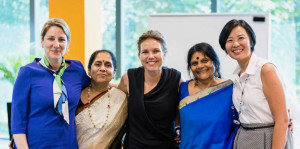Empowering women to have more control over how they lead their lives – whether it be their ability to work, using birth control or accessing education and health - is a crucial aim of the United Nations Sustainable Development Goals.
Evidence from many organizations, including the World Bank, shows that increasing female labour participation is important for society as a whole. Greater gender equality can enhance economic productivity, improve children’s outcomes, and make institutions and policies fairer for everyone.
Wasting the talents of women, however, can cost economies dear.
As countries are becoming more aware of the need to provide more opportunities for women, many are turning to digital technologies to help bridge the gender gap.
Internet friends
In India, where only 27% of women are in paid work and 70% of the total population lives in rural areas, Prime Minister Narendra Modi has developed a Digital India strategy that aims to develop a “digitally empowered society and knowledge economy” with the aim of increasing equality, especially in rural communities.
Here a partnership between Tata Trusts, the philanthropic arm of the multi-platform industrials group, and technology company Google India, is working to increase the number of women that can access the internet to help them become more entrepreneurial and financially independent.
The scheme, known as Internet Saathi - saathi means ‘friend’ in Hindi - aims to empower rural women, and by extension their communities, by enabling them to use the internet and enjoy its benefits in their daily lives.
It is estimated that only one in every 10 women in rural India can use the internet, because of a mixture of cultural barriers, poor understanding of its benefits and lack of access.
Vital skills
Launched in July 2015, the Internet Saathi program has reached more than 100,000 villages spread across 13 Indian states - and about 12 million women.
Over 35,000 trained saathis work every day in these villages to help women and children learn the internet skills that are so vital for 21st century economies. The program aims to reach over 300,000 villages in the coming years.
The Tata Trusts provide basic training on the usage and benefits of internet to the saathis, who are recruited from self-help groups and women’s federations.
Armed with knowledge and access to information, these women have learned new skills to start their own entrepreneurial ventures and earn extra income for their families.
Local initiatives, global benefits
One saathi, Rohini Sandeep Shirke, started a small bee-keeping business in 2014 in Maharashtra, a venture which is thriving after she created an email address, a Facebook page and a WhatsApp ID to promote her product. She also now accepts orders online.
Another, Sarita, from Gujuki in Rajasthan, has trained more than 13,000 women. Since her husband became unable to work about a decade ago, she has become the main breadwinner, and has used the internet to increase the crop yield of her farm. She has helped women in her north-Indian state to apply for welfare schemes and her family has applied for a toilet-building sanitation scheme.
Others have started to explore digital channels for revenue generation opportunities, demonstrating the potential that digital initiatives have in rural areas.
Gayatri, also from a village in Rajasthan, taught her neighbour Lakshmi, a seamstress, how to get online. Lakshmi now uses the internet for the inspiration and to learn new techniques.
She is also able to charge more for her work and uses the increased income to pay for education and support her mother.
On a more basic level, villagers have benefited from better access to healthcare information, helping them with everyday problems ranging from cracked feet to stomach cramps.
Such benefits clearly demonstrate the ability of the internet to improve the lives of communities that are far away from the kinds of essential services city dwellers take for granted and to transform the lives of people in every corner of the globe, regardless of birth, background or education.


